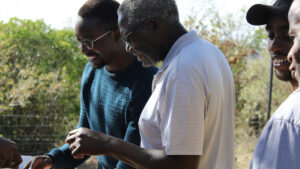“She said yes!” The reaction to these words can range from tears of joy to exuberant rejoicing and usually an abundance of congratulatory messages. Then, attention quickly shifts to wedding plans; parent introduction meetings; and, if you’re in my country, a traditional wedding before the white wedding. To say the least, there is a lot on the couple’s plate. It is during this busy season that premarital counselling usually takes place. However, my aim in this article is to encourage you to take a step back before popping the big question—or answering it—and to consider pre-engagement counselling.
The temptation to approach premarital counselling as just another item on the wedding checklist is high.
I will outline two major benefits why I believe it is wise to pursue pre-engagement counselling, as well as define what it is and when it should happen. I am not writing from personal experience, but rather from what I’ve gathered from biblical counsellors—either through reading or listening to them. Many biblical counsellors emphasise that for most couples, the temptation to approach premarital counselling as just another item on the wedding checklist is high. With so much else to plan, it’s easy to turn a blind eye to red flags or character issues that might require deeper reflection.
My aim is to encourage readers to consider pre-engagement counselling first, when there is no pressure to plan things, fewer distractions, and it’s much easier to be objective about each other’s character.
What is Pre-Engagement Counselling?
Pre-engagement counselling is the process in which a dating couple seeks counselling to get more clarity concerning their marriage pursuit before getting engaged and committing to marriage preparations. This counselling takes place before setting a wedding date, meeting each other’s parents, or participating in traditional ceremonies. It happens before an engagement ring is purchased and before the couple starts making wedding preparations.
Is it mandatory? No, but it is prudent.
Is it mandatory? No, but it is prudent. So, when and why should a dating couple pursue pre-engagement counselling even if they’re likely to do premarital counselling as well? There is no set timeline for when pre-engagement counselling should occur. However, wisdom suggests that a dating couple pursue it as soon as they begin having serious conversations about marriage, and the timing of those conversations varies from couple to couple.
Why Pursue Pre-Engagement Counselling?
This is the heart of this article: to convince you of why it is prudent to consider pre-engagement counselling. For the record, attending this counselling doesn’t guarantee a happy, trouble-free marriage. In fact, it doesn’t guarantee marriage at all. This counselling will serve to instruct both parties to make a sober decision over whether they continue pursuing marriage or if the best thing is to part ways. There are couples who have broken up even after getting engaged, during premarital counselling.
It doesn’t guarantee a happy, trouble-free marriage. In fact, it doesn’t guarantee marriage at all.
Engagement is a time when many people are most tempted to overlook significant character issues simply because they want to get married. After all, who wants to break off an engagement? It can feel shameful. Feeling like you’ve failed can be overwhelmingly painful. Broken engagements, especially within the local church, can be particularly difficult. Marriage is held in high regard as an institution that reflects the gospel, as emphasised in Ephesians 5. So pre-engagement counselling can help dating couples avoid:
- The shame of cancelling wedding plans
- Difficult conversations with parents about a broken engagement
- Potential financial losses from non-refundable wedding and honeymoon expenses
- Awkward discussions with vendors who have already been paid
- The embarrassment of returning to singleness after public engagement or premarital counselling.
This is wisdom calling out in the streets (Proverbs 1:20); a call for dating couples to walk in the way of wisdom.
Two Key Benefits of Pre-Engagement Counselling
1. To Assess Character
The most important thing to evaluate during pre-engagement counselling is a person’s character—particularly their godly character and evidence that they are truly born again and understand what it means to be saved, as outlined—for example—in Ephesians 2:1-10. Additionally, they should exhibit the fruit of the Holy Spirit (Galatians 5:22-23). It is crucial not to pursue a romantic relationship with, or marry, someone who isn’t actively growing in their walk with God, let alone an unbeliever.
Any issues that arise during this time give the dating couple an opportunity to address problematic areas.
Are we looking for perfection? No. However, a couple should observe a trajectory of growth in Christlikeness in one another. Expecting perfection distorts a biblical understanding of sanctification. Any issues that arise during this time give the dating couple an opportunity to address problematic areas without the added pressure of wedding planning. It also allows them to objectively evaluate their decision to get married. If serious concerns arise, the couple can wisely decide not to get engaged, thereby sparing themselves the enormous pain of breaking off an engagement later. While it would still hurt, the level of pain is significantly less than ending an engagement after making a public commitment.
Seeking pre-engagement counselling also demonstrates humility by inviting godly accountability into the relationship. The Bible teaches that “there is safety in an abundance of counsel” (Proverbs 11:14). The Christian life is not a solo journey. It is unwise for a couple to think they can navigate everything on their own without seeking godly wisdom.
2. To Address the Why of Marriage
People get married for many different reasons. But not all of them are godly. The Bible warns that “the heart is deceitful above all things and desperately sick” (Jeremiah 17:9). Pre-engagement counselling seeks to draw out the motivations of the heart (Proverbs 20:5), to determine whether the couple’s desire for marriage is God-centred and honouring before they invest too much in the relationship. Marshall Segal, in his book Not Yet Married, writes, “While the great prize in marriage is Christ-centred intimacy, the greatest prize in dating is Christ-centred clarity.”
People get married for many different reasons. But not all of them are godly.
The purpose of marriage should be understood as a God-designed institution meant to reflect the relationship between Christ and the Church. It is meant to display the gospel of Jesus Christ. Therefore, marriage should be entered into with sobriety and according to God’s principles. Jim Newheiser summarises the important aspects of marriage in his book, Marriage, Divorce and Remarriage: “marriage is covenantal, marriage is under God, marriage is for companionship, marriage authorises sexual intimacy, marriage is for life.”
Final Thoughts
There is much more to be said about pre-engagement counselling—I have only scratched the surface. However, this is an exhortation to enter the engagement period with godly wisdom and serious consideration. After all, dating is prayerfully considering marriage. To conclude, I highly recommend a great booklet that informed my knowledge on this topic: Pre-Engagement Counselling by David Powlison and John Yenchko. Pursuing pre-engagement counselling is not mandatory. It does not guarantee marriage or a trouble-free marriage. However, it offers the great benefit of seeking wisdom before you pop—or answer—the big question.














